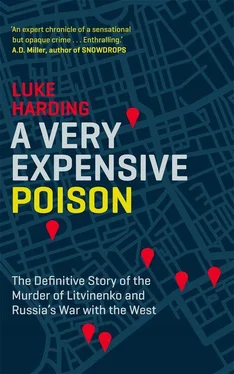Forensic experts would test the entire bar area, the tables, dishwasher and crockery. They examined 100 teapots, as well as cups, spoons, saucers, milk jugs. Litvinenko’s teapot wasn’t difficult to discover – it gave off readings of 100,000 becquerels per centimetre squared, a satanically high number. The highest reading came from the spout. (The teapot was put in the dishwasher afterwards and unknowingly reused for subsequent customers.) The table where they sat registered 20,000 becquerels.
Polonium was a miasma, a strange creeping fog. It was found inside the dishwasher, on the floor, till, the handle of a coffee strainer. There were traces on bottles of Martini and Tia Maria behind the bar, the ice cream scoop, a chopping board. It turned up on chairs – with large alpha radiation readings from where the three Russians sat – and the piano stool. Whoever sent Lugovoi and Kovtun to London must have known of the risks to others. Apparently they didn’t care.
The most crucial piece of evidence was discovered several floors above the Pine Bar. It was found in Kovtun’s room, number 382. When police forensic teams took apart Kovtun’s bathroom sink they found a mangled clump of debris. The debris was stuck in the sediment trap of the sink’s waste pipe. Tests on the clump showed it contained 390,000 becquerels of polonium. The levels were so high that they could only have come from primary contamination – from polonium itself.
After putting the poison in Litvinenko’s teapot, Kovtun went back upstairs to his room. There in the bathroom he poured the rest of the liquid polonium solution down the sink. No one else – other than Lugovoi and Sokolenko – had access to the room. Police concluded that Kovtun had knowingly handled the murder weapon, and afterwards got rid of it. It was an intentional act of disposal.
The science was objective, conclusive and utterly damning. As an inquiry into Litvinenko’s poisoning would later hear, it had the simplicity of undeniable fact. Kovtun would claim innocence. He was never able to explain away this pivotal piece of evidence.
The Russian operation to murder Litvinenko would have had a codename – so far unknown. It could finally be marked down as a success. It was the sixth anniversary of Litvinenko’s arrival in Britain, on 1 November 2000. He didn’t know it yet, but he was dying. The agent used to kill him had been chosen in order to leave no trace of how death was brought about. It was working. From this point on nothing – not even the most gifted medical team, not even a miracle from the heavens – could save him.
6
A Bit of a Puzzle
Critical care unit, University College Hospital, London, November 2006
‘This case is not political. This case is criminal’
LITVINENKO TO DETECTIVE INSPECTOR BRENT HYATT, 20 NOVEMBER 2006
That evening Alexander Litvinenko began to feel violently unwell. Earlier, Marina had cooked him a light dinner.
The meal was something of a celebration. Six years previously, on 1 November 2000, the Litvinenkos had escaped Russia and arrived in the UK. The years had been good ones. Litvinenko had found work. He was a self-employed writer and a part-time British spy. Marina had made friends, learned English. Anatoly, now twelve, was studying at an elite London boys’ school.
Russia wasn’t forgotten, of course: Anatoly remembered the fierce winters, sledging in the snow, the Moscow metro with its grandiose ceilings and art deco lamps. There was no prospect of going back there, and in the meantime Britain had become home. Litvinenko viewed his newly acquired British citizenship – it came through three weeks previously – as a kind of marvellous protective shield. In the past his enemies had hounded him in London: there had been menacing phone calls, firebombs tossed outside his Muswell Hill home. But surely these ghosts were gone?
After dinner, Litvinenko sorted out his files, sat at his computer and watched the news. A journalist contact called him from the US. At about 11 p.m. he and Marina turned in.
Then, ten minutes later, Litvinenko was retching and vomiting. ‘I started to feel nauseous,’ he told police. ‘Gradually, Marina said: “Maybe it will pass,” and I said: “No, I don’t think it will pass.” And then I started vomiting. I managed to run as far as the toilet bowl in our room and that’s it. About twenty minutes later I vomited again.’
Marina said: ‘Suddenly, he started to feel unwell. He said he felt sick. It was very sudden. Of course, he couldn’t say anything. He just vomited.’ When it stopped, Litvinenko said that the feeling was similar to that he’d had on 16 October, after his meeting with Lugovoi and Kovtun. Later that evening he’d thrown up once and afterwards recovered.
Marina assumed that this new episode would also pass. First, Litvinenko threw up his dinner. He vomited again. This time his sick looked like water, Marina noticed, and was ‘a very strange colour’. Marina prepared a common Russian remedy for stomach problems: a little magnesia added into water. Her husband drank it. Still he didn’t feel any better.
After an hour, Litvinenko moved into the study, so as not to disturb his wife and son, who had school the next day. He passed a wretched night. ‘Every twenty or thirty minutes I had to run to the toilet and I was vomiting, vomiting, vomiting,’ he said. The manganese hadn’t worked – the foam was coming out of his mouth.
At 6 a.m. Marina woke and peered inside. Litvinenko was awake, looked terrible, and told her: ‘I can’t stop vomiting.’ He said that the stomach contractions kept coming, even though there was nothing to throw up. Additionally, Litvinenko complained he couldn’t breathe properly. He said: ‘I need more oxygen.’ It was a cold day outside; she threw open the windows. Something was very wrong. Litvinenko said later: ‘I was feeling really bad.’ The strong pains in his stomach grew. He said to his wife: ‘Marina, I think I have been poisoned.’
That morning Marina dropped Anatoly off at East Finchley tube station as usual, and called a Russian doctor, Yuri Prikazchikov, who advised her to buy mineral salts. She visited the chemist’s. Litvinenko drank the salts. He threw them up immediately. He was increasingly exhausted, unable to eat or drink.
Litvinenko was forty-three years old, and in extremely good physical shape. Every week while Anatoly was at a taekwondo class, Litvinenko would run 10 miles (15 km). Afterwards, he swam vigorously up and down the East Finchley leisure centre pool. In central London he walked everywhere. He was never ill. Except now he was.
Marina suggested calling an ambulance. ‘It was a very strange feeling. We didn’t know what to do,’ she said. Her husband said no. Then, in the early hours of 3 November, at 2 a.m., Litvinenko relented, and said: ‘Please Marina, we should call.’ She dialled 999 and the ambulance arrived within five minutes; two women paramedics checked his blood pressure and pulse; they concluded he probably had some kind of bacterial infection. They advised water and painkillers and departed.
The pain got worse. Litvinenko was also suffering from diarrhoea; he noticed he was passing blood. Marina rang Dr Prikazchikov again. At 2 p.m. he arrived at the Litvinenkos’ home in Osier Crescent; the doctor took one look at Litvinenko and, without examining him further, took a step backwards, wide-eyed. The doctor told him: ‘I don’t know what illness it is, but it looks very much like typhoid fever but it is not typhoid fever.’ Prikazchikov said he needed immediate hospitalisation. An ambulance came and took him to Barnet and Chase Farm Hospital in north London.
For doctors at Barnet Hospital, Litvinenko was one of numerous admissions – another patient tossed their way during a hectic winter season, punctuated by flus, superbugs and a spike in elderly visitors.
Читать дальше












